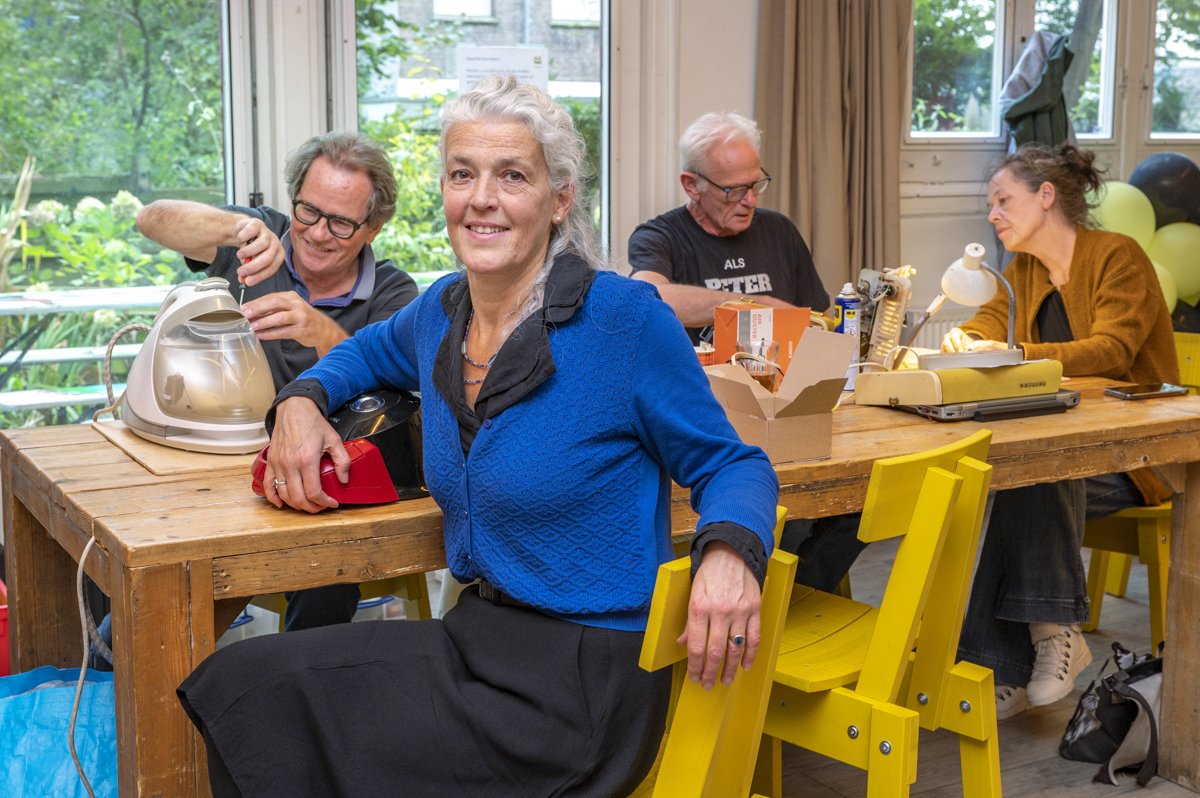
Martine Postma at RepairCafé Meevaart. | Martin Waalboer/Repair Café International
A warm welcome back to “Women in Circularity,” where we shine a light on women moving us toward a circular economy. This month, I connected with a reuse movement innovator who specializes in building “repair communities” around the globe: Martine Postma. Martine is the founder and director of Repair Café International – a nonprofit foundation that makes reuse a part of the local community by sharing repair expertise through accessible community events. She has more than 14 years of experience in waste reduction and community building.
How has your career shifted over the years?
A big shift happened a little over a decade ago. I was a journalist writing about waste prevention but I wanted to do more. I wanted to actively help change our society’s throw-away behavior by offering an alternative – a fun space where neighbors, along with local experts, could come together and repair broken items. At these “repair cafés” people would see with their own eyes that repair is a perfectly good option and that they can do it too. I tested this idea in 2009 and it turned out to be a great success. I then started Repair Café International and have been spreading the concept of Repair Cafés ever since. We provide a digital starter kit that helps local volunteers to start a Repair Café in their community. This works! Today there are almost 3,000 Repair Cafés in more than 40 countries across the globe.
In what ways does your reuse work contribute to the greater good?
Repair Cafés show people worldwide that you don’t have to throw items away when they break, but that there is such a thing as repairing. It shows that repair need not be difficult, expensive or dull, but can be easy, affordable and fun. Once you have been to a Repair Café with a broken item and have succeeded in fixing it, together with a volunteer from your neighborhood who knows what to do, your mindset will start to change. You will begin to understand that it’s crazy to throw things away when only one tiny little thing is wrong with them that could easily be fixed. This way, the next time when something breaks, you will think, “Maybe I can fix that too!” This way, Repair Cafés contribute to less waste worldwide, preserve repair skills in the local community and empower people, so that their local community becomes more resilient.
Have you worked on any recent initiatives that you particularly enjoyed?
I particularly like to see the success of Repair Cafés as evidence that the world is ready for change, and that there is support for a transition to a more sustainable economy. This repair movement demonstrates that people want to be able to repair their own stuff, and that we need the right to repair our products. The worldwide Repair Café network is my contribution to the fight for the “right to repair,” which grows every day and advocates for repairable products. This paradigm shift also demonstrates that the linear economy is simply not good enough and must be replaced by a more sustainable, circular model.
Why are communities around the globe coming together to help each other through the ‘gifting economy’?
I think more and more people are beginning to understand that we cannot go on living and consuming the way we have gotten used to over the last few decades. It is not a sustainable way of living. We pollute the earth, which is our only home. We use way too much of our natural resources in producing new stuff and throwing things out instead of caring for them and repairing them. We cause enormous problems like global climate change and we are beginning to see the effects of our actions. I think this is what motivates people to come together and look for solutions. But we still need more people to see the size of our environmental problems and to understand that the solution – a more eco-friendly lifestyle – will bring us much more than it will take from us.
Was there a musician who helped inspire your work?
When I was a teenager, my mother introduced me to the music of Don McLean, specifically his song “Tapestry,” which ends with the following lines: “If man is allowed to destroy all we need, he will soon have to pay with his life for his greed.” This may sound dramatic, but I’m afraid this is true and these lines still inspire me to do what I do.
MaryEllen Etienne is the creator of “Women in Circularity.” Etienne works on the Market Transformation and Development team for the U.S. Green Building Council. She has over 20 years of experience in sustainability and is a champion of the circular economy.



